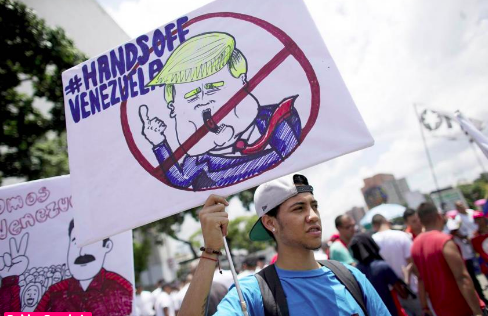
Photo Courtesy of greenleft.org
By Max Sano || Staff Writer
On January 28th, the U.S. Treasury Department’s Office of Foreign Assets Control (OFAC) imposed new sanctions on Venezuela’s state-owned oil company–PdVSA. While there are some American companies that share business relationships with PdVSA, they are only authorized to continue their engagements until this summer. These sanctions arrive after more than a decade of related actions against the Venezuelan over a number of violations, including human and drug-tracking complaints, human rights violations, political corruption, terrorism, and numerous other financial sanctions.The impact of all U.S. sanctions has had a debilitating Today, instability and chaos run amok the “petrostate” (nation that depends on nonrenewable energy) and has already caused lasting damage to the Venezuelan people and the surrounding region. First, let’s look at why these sanctions were established and analyze the effects they have had on Venezuela and its neighbors.
Sanctions on Venezuela began in 2006 in response to American concern over Venezuela’s weak stance on terrorist activities. In 2008, the U.S. government froze the assets and prohibited financial transactions on two individuals and two travel agencies in Venezuela for providing financial support to the radical Lebanese-based paramilitary organization, Hezbollah. Separately, the U.S. government has been insistent on Venezuela’s failure to adhere to international narcotics agreements. Ever since, the Treasury Department has imposed economic sanctions on at least 22 individuals (some of which are current and former government officials) and 27 companies with ties to the Venezuelan government. The U.S. government has also cracked down on political corruption and anti-democratic campaigns in Venezuela, imposing sanctions on 65 Venezuelans involved in such actions to date.
Moreover, President Donald Trump has led a campaign in support of the opposition leader: Juan Guaido. As leader of the opposition party and head of the National Assembly, Guaido declared himself acting president of Venezuela. Just last week, Trump reaffirmed his support for Guaido in a call on Wednesday, January 30th. International support for the acting president is not limited to the United States. On Monday, February 4th, a coalition of European countries recognised the self-proclaimed leader of Venezuela as the legitimate president of the country, striking a major blow to President Maduro’s rule. Trump’s tough stance on Venezuela has garnered unfamiliar bipartisan support in both Congressional bodies as well, albeit several liberal Democratic lawmakers such as Rep. Ro Khanna of California and Rep. Ilhan Omar of Minnesota. There are several bills on the floor that would address the worsening political and socio economic crises in the country.
What are the effects of these crises on the Venezuelan people? Economic and political disaster has resulted in ridiculously high prices on food, water and various other resources. In 2018, the annual national inflation rate soared over 1,000,000 percent. According to one Venezuelan resident, the price of one Big Mac from McDonald’s is worth more than a month’s pay. In addition, a once robust transportation system is now no more due to lack of autoparts. A subway system that used to be hailed as the best in Latin America in the 1980’s and 1990’s is now in ruins. What was once a developing economy is mired in mayhem due to dependence on petroleum before establishing strong democratic institutions.
In an afflicted to nation such as Venezuela, which for decades has relied upon The indicators of a petrostate represent the current state of Venezuelan affairs. There is a clear dependence on oil in the national economy, as the commodity represented 98 percent of its exports and a whopping 50 percent of its total GDP in the 2018 fiscal year. At the same time, oil output has reached an all time low and GDP shrunk by double digits for a third consecutive year. On top of all that, President Maduro has violated democratic traditions in order to maintain power, including acusals of stacking courthouses in order to protect drug trafficking. The Council of Foreign Relations argues that oil dependence, falling production, spiraling economy, and growing autocracy, among other factors, point to Venezuela being “the archetype of a failed petrostate”. In order for petrostates like Venezuela to adapt and arise from their economic conundrums, there must be strong democratic institutions that ward off corruption, investment in a variety of international assets, and a global shift to renewable energy sources.
If you want to learn more about the ongoing Venezuelan Crisis, go to the website for the Council on Foreign Relations where they published an in-depth video titled “The Evolving Crisis in Venezuela”.
First-year Max Sano is a contributing writer. His email is msano@fandm.edu.
